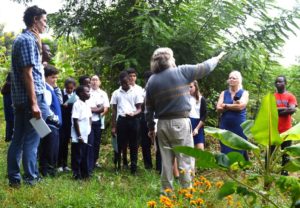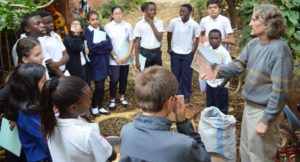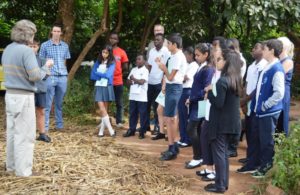 This last week we hosted two groups of students from the Bishop Mackenzie International School in Lilongwe. The students are currently studying factors which lead to the collapse of civilizations, so they were interested in learning more about how Permaculture can help to avoid these mistakes. The word ‘Permaculture’ began as a combination of the words ‘Permanent’ and ‘Agriculture’, but most practitioners now teach it as ‘Permanent Culture’. The sustainable use of resources is at the core of every good Permaculture design, and the three ethics–Earth Care, People Care, Fair Share–are the guiding principles for ensuring sustainable civilizations.
This last week we hosted two groups of students from the Bishop Mackenzie International School in Lilongwe. The students are currently studying factors which lead to the collapse of civilizations, so they were interested in learning more about how Permaculture can help to avoid these mistakes. The word ‘Permaculture’ began as a combination of the words ‘Permanent’ and ‘Agriculture’, but most practitioners now teach it as ‘Permanent Culture’. The sustainable use of resources is at the core of every good Permaculture design, and the three ethics–Earth Care, People Care, Fair Share–are the guiding principles for ensuring sustainable civilizations.
 When we asked the students what types of things they were learning about which led to the collapse of civilizations, their responses were all centred around the misuse of resources (e.g. water, food, natural resources, etc.). We are currently seeing many unsustainable environmental practices increasing throughout the world (e.g. deforestation, monocropping, the use of toxic chemicals, an over-reliance on fossil fuels, etc.). Permaculture offers solutions for many of today’s challenges.
When we asked the students what types of things they were learning about which led to the collapse of civilizations, their responses were all centred around the misuse of resources (e.g. water, food, natural resources, etc.). We are currently seeing many unsustainable environmental practices increasing throughout the world (e.g. deforestation, monocropping, the use of toxic chemicals, an over-reliance on fossil fuels, etc.). Permaculture offers solutions for many of today’s challenges.
 The students learned about healthy soil and water management, integrated pest management, rainwater harvesting, composting toilet systems, worm farming, nutritional diversification, renewable energies, seed collection, sustainable income generating activities, and much more. By the end of this month, we are scheduled to have four more visits of students from the Bishop Mackenzie school. It’s wonderful to see the excitement and interest growing about the potential of Permaculture to help create Permanent Cultures!
The students learned about healthy soil and water management, integrated pest management, rainwater harvesting, composting toilet systems, worm farming, nutritional diversification, renewable energies, seed collection, sustainable income generating activities, and much more. By the end of this month, we are scheduled to have four more visits of students from the Bishop Mackenzie school. It’s wonderful to see the excitement and interest growing about the potential of Permaculture to help create Permanent Cultures!
